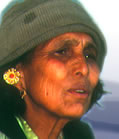 |
 |
||
 |
|||
|
RELATED THEMES education migration politics OTHER LOCAL THEMES BACKGROUND |
justice and crime
Traditional mediation and arbitration methods seem to be effective in settling minor disputes and there is obviously still a high degree of respect for the conciliatory role of elders and "wise people". People have recourse to the modern legal system for more serious matters but many complain of the expense this involves and of corrupt officials, although some say there is less corruption now than under the Panchayat system. A number of people express concern that the illiterate are disadvantaged by modern legal systems, where the written word is paramount. Among the new interviews (Nepal 24-32) one woman describes the exploitation she encountered in the carpet factories of Kathmandu, and the impossibility of a redress for a poor migrant from the hills (Nepal 24). Another woman (Nepal 30), whose powerful story concerns her enforced period as a prostitute in India and eventual escape back to Kathmandu, describes police corruption in India and the insensitive treatment to women like herself by Nepali lawyers and police who are meant to "help" them. Several narrators mention that wealthier villagers still retain much power and influence in village society: one woman (Nepal 28) mentions that although the government has passed legislation against caste discrimination, the lower castes may hesitate to use this, since they all live in the same community and "We have also to consider their relatives and their husbands who have prestige. Moreover, tomorrow we may need that same society, so.we let it go." Another (Nepal 24) talks of how hopeless it is to oppose a powerful villager who she believes has taken their land: "They are now such big pradhanpanch people. All people from the village follow a running rivulet. Nobody follows a drying rivulet. And that is the way now - people stick to those who can deliver for them." Most striking in the new interviews (Nepal 24-32), however, are people's views of the army and the police in the conflict between the government and the Maoists. It is clear that violence and intimidation have dramatically increased in many rural areas as the poor are caught between government and Maoist forces (See Conflict), and that few people rely on the state for protection or security any more. One anonymous narrator (Nepal 26) also suggests that some people are taking the opportunity to settle personal scores under the cover - and confusion - of the political activity. She acknowledges that: "Maoists have targeted some on the basis of personal anger and hostility," but also tells a story about an attack on her brother which may not have been instigated by the Maoists: "We discovered that the action being taken against him was unwarranted. Now is it really Maoists taking action against my elder brother or not? It is possible that local boys may have come and beaten up our elder brother." quotes about justice and crime"There was no one on my behalf to ask for the money I had earned... they dominated me. 'You're always falling ill,' they scolded. and if they spent Rs 300 [on medicine] then they inflated that to Rs 1000 and billed me accordingly. They used to say, 'Your debt is more than what you get from working,' and they didn't pay me anything. Even after I had learnt to weave carpets, the instructor took my salary. When I demanded [it], he beat me." ".we are harassed by lawyers and police here after we come back to Nepal. The way they question - it is like scratching a wound. They question us as if we went [to the brothels] knowingly. They have done this willingly, that's what they think. We have come back from that sort of place with all the pain and sufferings and even then.when we go to file a complaint, the men there question us and ask: "How many did you sleep with? How did you sleep with them? You are this and you are that." "Those days, member of Gaun Bikas Samiti (Village Development Committees) would decide the case. They would take bribes and tell those who were right they were wrong, and those who were wrong they were right.. But now we don't agree about that kind of decision." "In the district if you have any law suit they want their share, they ask for a certain amount. They want money for writing and speaking and it is different or more [money] for those who cannot speak out or write. The employees there work according to the customers. If they take 200 rupees from the ones they don't know, they take 40 rupees only from their friends or people they know. Till now I haven't used a lawyer, I have done everything by myself." "In those days, we went to the Talukdar (tax collector). Then in the Panchayat era there were village members and presidents where we could consult for law and justice. If the case was not satisfactory we would go to the Pradhan Pancha. These days also, if possible, we go to the wise and learned old men of the village and compromise. If the case is difficult then we go to the president of the Gaun Bikash Samiti; if the case cannot be dealt then we go to the district administration. Small arguments are dealt within the village, but fights for land are taken to the district office." |
|